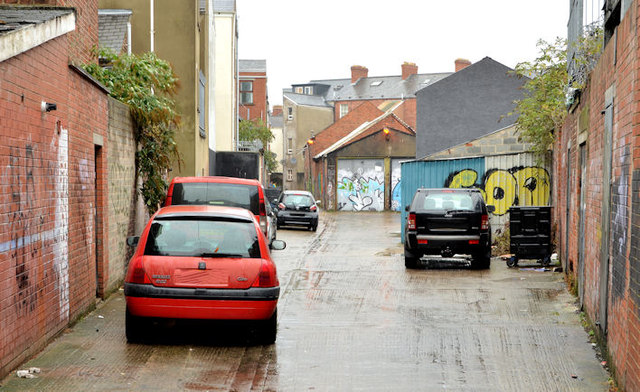The United Kingdom’s security service raised the domestic terrorism threat level in Northern Ireland to “severe” this week. The raised threat level follows attacks on police officers.
The MI5 agency this week raised the domestic terrorism level in Northern Ireland to “severe,” the second-highest category from its previous level of “substantial.” The increased threat level follows recent attacks on police officers and ahead of the gathering of political leaders in the region in April to commemorate the 25th anniversary of the 1998 Good Friday Agreement, which largely ended decades of sectarian violence in the province.
US President Joe Biden said this month that he accepted an invitation by British Prime Minister Rishi Sunak to visit the region in April. Former US President Bill Clinton and former Secretary of State Hillary Clinton will also be attending events related to the anniversary.
“The public should remain vigilant but not be alarmed and continue to report any concerns they have,” said British Northern Ireland minister Chris Heaton-Harris in a statement.
Northern Ireland’s Police Service Chief Constable Simon Byrne said his officers would remain determined to deliver “a visible, accessible, and responsive community-focused policing service to keep people safe.”
Last month, an off-duty police officer was injured after a gun attack that the police said was carried out by the new IRA, a smaller group compared to the Irish Republican Army that disarmed following the Good Friday Agreement. Despite the peace deal largely ending decades of political violence, police officers have still been targeted by splinter groups of nationalist militants opposed to British rule in the province.
Leaders are expected to gather in Belfast in April to celebrate the signing of the agreement that was partially brokered by the US under the Clinton administration.
On Tuesday, the region’s Orange Order said it voted unanimously to oppose the return of the devolved government unless changes are made to the new post-Brexit trade deal now known as the Windsor Framework. The move by the pro-British group could put added pressure on the Democratic Unionist Party to seek concessions from London.
The DUP has said it will not stop its year-long boycott of the devolved government without “further clarification, re-working, and change” to the new trade deal. Sunak’s government has maintained the deal is not open for renegotiation.



 Trump Says “Very Good Talks” Underway on Russia-Ukraine War as Peace Efforts Continue
Trump Says “Very Good Talks” Underway on Russia-Ukraine War as Peace Efforts Continue  Pentagon Ends Military Education Programs With Harvard University
Pentagon Ends Military Education Programs With Harvard University  Trump Signs “America First Arms Transfer Strategy” to Prioritize U.S. Weapons Sales
Trump Signs “America First Arms Transfer Strategy” to Prioritize U.S. Weapons Sales  U.S. to Begin Paying UN Dues as Financial Crisis Spurs Push for Reforms
U.S. to Begin Paying UN Dues as Financial Crisis Spurs Push for Reforms  US Pushes Ukraine-Russia Peace Talks Before Summer Amid Escalating Attacks
US Pushes Ukraine-Russia Peace Talks Before Summer Amid Escalating Attacks  U.S. Lawmakers to Review Unredacted Jeffrey Epstein DOJ Files Starting Monday
U.S. Lawmakers to Review Unredacted Jeffrey Epstein DOJ Files Starting Monday  India–U.S. Interim Trade Pact Cuts Auto Tariffs but Leaves Tesla Out
India–U.S. Interim Trade Pact Cuts Auto Tariffs but Leaves Tesla Out  Trump Backs Nexstar–Tegna Merger Amid Shifting U.S. Media Landscape
Trump Backs Nexstar–Tegna Merger Amid Shifting U.S. Media Landscape  China Warns US Arms Sales to Taiwan Could Disrupt Trump’s Planned Visit
China Warns US Arms Sales to Taiwan Could Disrupt Trump’s Planned Visit  Trump Signs Executive Order Threatening 25% Tariffs on Countries Trading With Iran
Trump Signs Executive Order Threatening 25% Tariffs on Countries Trading With Iran  Trump Allows Commercial Fishing in Protected New England Waters
Trump Allows Commercial Fishing in Protected New England Waters  Norway Opens Corruption Probe Into Former PM and Nobel Committee Chair Thorbjoern Jagland Over Epstein Links
Norway Opens Corruption Probe Into Former PM and Nobel Committee Chair Thorbjoern Jagland Over Epstein Links  TrumpRx.gov Highlights GLP-1 Drug Discounts but Offers Limited Savings for Most Americans
TrumpRx.gov Highlights GLP-1 Drug Discounts but Offers Limited Savings for Most Americans  Ohio Man Indicted for Alleged Threat Against Vice President JD Vance, Faces Additional Federal Charges
Ohio Man Indicted for Alleged Threat Against Vice President JD Vance, Faces Additional Federal Charges  Trump Lifts 25% Tariff on Indian Goods in Strategic U.S.–India Trade and Energy Deal
Trump Lifts 25% Tariff on Indian Goods in Strategic U.S.–India Trade and Energy Deal  Federal Judge Restores Funding for Gateway Rail Tunnel Project
Federal Judge Restores Funding for Gateway Rail Tunnel Project  New York Legalizes Medical Aid in Dying for Terminally Ill Patients
New York Legalizes Medical Aid in Dying for Terminally Ill Patients 































